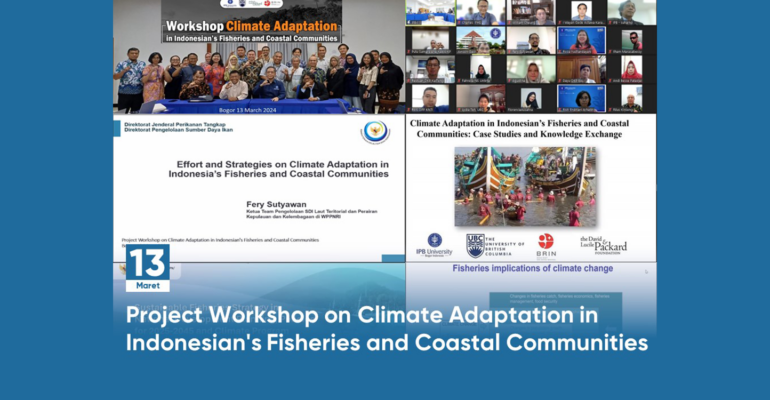Dean of FPIK IPB University Explains the Impact of Climate Change on Fisheries Production in Indonesia

The Faculty of Fisheries and Marine Science (FPIK) of IPB University organised a workshop entitled “Climate Adaptation in Indonesia’s Fisheries and Coastal Communities” on 13/3. This workshop is part of the Climate Adaptation Project research, a collaboration between IPB University, the University of British Columbia and the National Research and Innovation Agency (BRIN) supported by the World Bank and The David and Lucile Packard Foundation.
This workshop was held in a hybrid format in the Seminar Room of the Centre for Coastal and Marine Resources Studies, IPB University and was attended by academics, practitioners and related stakeholders.
On this occasion, Prof Fredinan Yulianda, Dean of FPIK IPB University emphasised the importance of appropriate climate adaptation strategies for the fisheries sector and coastal communities which are increasingly vulnerable to the impacts of climate change.
“Climate change is really happening now and Indonesia has been predicted to be one of the most vulnerable countries to climate change. Climate change is already affecting fisheries production, including impacting fishing households and coastal communities that depend on marine biodiversity and fisheries in Indonesia,” said Prof Fredinan.
Prof William Cheung from the University of British Columbia and Principal Investigator of the Climate Adaptation Project research explained that Indonesian waters have faced many changes and threats that must be highlighted in relation to climate change.
Meanwhile, Fisheries Economics expert from the University of British Columbia, Prof Rashid Sumaila explained, “The current climate change also has implications for the economy and fisheries sector, including fishermen, wholesalers, retailers and people in restaurants who depend on fish and seafood,” he explained.
Prof Jonson Lumban Gaol, as Co-Principal Investigator of the research, together with Dr Alan Koropitan, as Lecturer in the Department of Marine Science and Technology, FPIK IPB University, explained that the focus of this research is climate adaptation in lemuru fisheries in the Bali Strait.
“This research includes collecting in situ data on the ecology and socioeconomics of lemuru fisheries and climate projection models for lemuru fisheries commodities. Lemuru fishery plays an important role in the socio-economic livelihood of the people in the Bali Strait,” said Prof Jonson.
Prof Jonson revealed, in order to improve capacity building, he has initiated the formation of the Climate Change and Fisheries Working Group in Indonesia together with a number of academics and researchers in Indonesia.
“We open opportunities for other academics and researchers in Indonesia to join this working group and discuss together,” he explained.
The workshop also invited relevant experts and stakeholders to align research results with national policies including Mohamad Rahmat Mulianda, Director of Marine and Fisheries, Ministry of National Development Planning; Fery Sutyawan, Coordinator of Fish Resources Group (SDI) Territorial Sea and Islands Waters, Ministry of Marine Affairs and Fisheries; and Prof Luky Adrianto, Chief of Marine, Maritime and Fisheries Centre, International Research Institute, IPB University. (IAAS/RUM)



